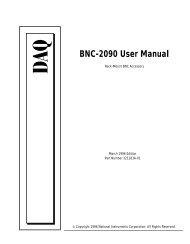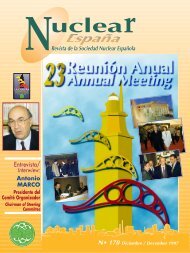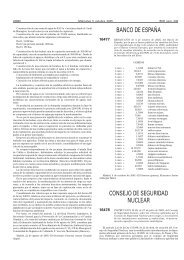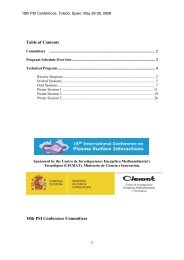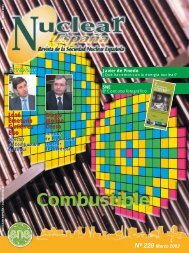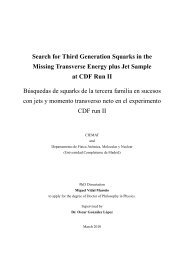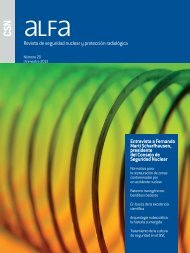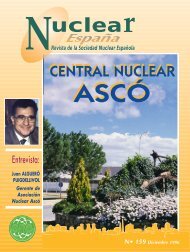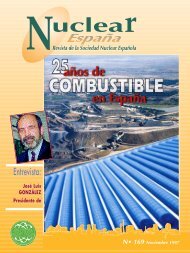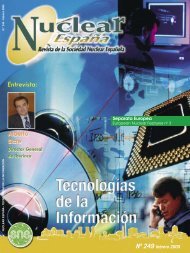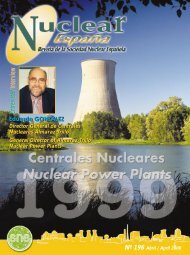(Operations, Fuel, Wastes and Decommissioning andNuclear Communications) and three ad-hoc Groups(Nuclear Plant Administrators, Probabilistic SafetyAssessment and Radiological Protection and Health).The Nuclear Energy Committee holds monthly meetingsto deal with the management, supervision andmonitoring of the work performed by the Commissionsand Groups reporting to it and to take appropriatedecisions. It also undertakes preparation of the meetingsof the CSN(*)-Electricity Sector Liaison Committee anddeals with the ENUSA and ENRESA ParityCommissions and with participation by the ElectricitySector in international organizations competent innuclear power plant operations, such as WANO andUNIPEDE or INPO and NEI in the United States.Of the matters dealt with during 1995 I shall underlinethe following:- Organization of a working session on OperatingExperiences, in order to analyze the most significantevents taking place in the Spanish plants and thelessons learned.- Delivery of a course on event analysis methodologyfor plant personnel.- Participation of Spanish experts in WANO’s PeerReview programme for evaluating NPP performance.- Follow-up of the new American criteria for theelimination of regulatory requirements in relation tomarginal safety issues, on the basis of cost/benefitanalysis.- Organization in Spain of the European Union’sCourse on Radiological Protection.- Preparation of specific issues dealt with at sectoriallevel with the regulatory body, such as nuclear powerplant performance indicators, periodic safety reviewsand the maintenance rule.- Performance of a study aimed at gaining insight intothe external nuclear fuel procurement andmanufacturing market.- Coordination of actions aimed at reducing plantwaste production volumes, within the framework of theagreement between UNESA and ENRESA.- Monitoring of activities carried out prior todecommissioning of the Vandellós I plant.- Preparation of six-monthly reports on the operation ofSpanish nuclear power plants and distribution tomembers of Parliament, the Regulatory Body, theMinistry of Industry and Energy and the national andlocal media.- Preparation of a database on socioeconomic andtechnical factors pertaining to the areas surroundingnuclear power plants, for use by those responsible forsocial communications at the plants.- Drafting of the annual report on Operating andMaintenance costs.- Exchange of information between plants on thecontracting of supplies and services.-Development of a nuclear power plant remaininglifetime management system.- Development of a prototype for the in-situsurveillance of pressure sensors by advanced noiseanalysis techniques, an activity which is to betransferred to the new utility grouping DTN.- Completion of on-site operating assistance activitiesat the South Ukraine nuclear power plant, provided byUNESA since 1993 under contract to the EuropeanUnion, the second phase of which has been transferredto DTN.LAW GOVERNING THE NATIONAL ELECTRICITYSYSTEM (LOSEN)Reference must be made to the entry into force on 20thJanuary 1995 of the LOSEN, approved on 28thDecember 1994, the fundamental objective of which is togive a higher legal standing to the fundamental rulesand regulations of the Electricity Sector, with a view toguaranteeing the security of electricity supply at theleast possible cost and with adequate levels of quality.Some 40 rules and regulations will be required fordevelopment of the LOSEN to be put into practice. Asseveral of the representatives of the Sector haverepeatedly pointed out, the specific content of this widerange of rules will be a determining factor for rigorousevaluation of the real impact of this Law on the Spanishelectricity system.The most relevant developments which have occurredsince the LOSEN was approved have been the creationand start-up of the National Electricity SystemCommission (CSEN) as a new regulatory body, a seriesof modifications to the Stable Legal Framework (MLE),the system used to determine electricity tariffs, and theDecree regulating the securitization of the debt derivedfrom investments in the five nuclear units moratorium,(*) CSN: Nuclear Safety Council, the Spanish nuclearregulatory body.de explotación de centrales nuclearestales como WANO y UNIPEDE ó IN-PO y NEI en los EE.UU.De entre los asuntos tratados durante1995 destacaré los siguientes:- La organización de una jornadasobre Experiencias Operativas paraanalizar los sucesos más significativosocurridos en las centrales españolasy las lecciones aprendidas delos mismos.- La impartición de un curso sobremetodología de análisis de sucesosdestinado al personal de las centrales.- La participación de expertos españolesen el programa de WANO deevaluación del funcionamiento decentrales (Peer Reviews).- El seguimiento de los nuevos criteriosamericanos para la eliminaciónde requisitos reguladores en temasmarginales para la seguridad sobre labase de análisis coste/beneficio.- La organización en España delCurso de la Unión Europea sobreProtección Radiológica- La preparación de temas específicostratados sectorialmente con elorganismo regulador, como son losindicadores de funcionamiento de lascentrales nucleares, las revisionesperiódicas de seguridad y la regla demantenimiento.- La realización de un estudio paraconocer la situación del mercado exteriorde aprovisionamiento y fabricaciónde combustible nuclear.- La coordinación de actuacionesdirigidas a reducir, en el marco delacuerdo alcanzado entre UNESA yENRESA, las producciones de residuosde las centrales.- El seguimiento de las actividadesprevias al desmantelamiento dela central de Vandellós I.- La preparación de los informessemestrales sobre el funcionamientode las centrales nucleares españolasy su difusión a miembros delParlamento, Organismo Regulador,Ministerio de Industria y Energía ymedios de comunicación nacionales ylocales.- La preparación de una Base dedatos socio-económicos y técnicosdel entorno de las centrales nuclearespara su utilización por los responsablesde comunicación de éstas.- La elaboración del estudio anualsobre costes de Operación yMantenimiento.- El intercambio de informaciónentre las centrales sobre contrataciónde suministros y servicios.- El desarrollo de un sistema degestión de vida remanente de centralesnucleares.- El desarrollo de un prototipo parala vigilancia in-situ de sensores depresión por técnicas avanzadas deanálisis de ruido, actividad que setransferirá a la nueva entidad eléctricaDTN.- La finalización de las actividadesde asistencia operacional in-situ a lacentral nuclear de Ucrania del Sur,que desde 1993 venía desarrollandoUNESA bajo contrato con la UniónEuropea y cuya segunda fase ha sidotransferida a DTN.LEY DE ORDENACIÓN DELSISTEMA ELÉCTRICO NACIONAL(LOSEN)Es obligado hacer una referencia a laentrada en vigor el pasado 20 deEnero de 1995 de la LOSEN, aprobadael 28 de Diciembre de 1994, cuyoobjetivo fundamental es elevar a rangode ley la normativa fundamentaldel Sector Eléctrico que pretende garantizarla seguridad del suministroeléctrico al menor coste posible y conuna calidad adecuada.Van a hacer falta alrededor de 40 normasy reglamentos para llevar a lapráctica el desarrollo de la LOSEN.Como diversos representantes delSector hemos señalado en variasocasiones, el contenido concreto deese amplio conjunto de normas serádeterminante para poder evaluar conauténtico rigor el impacto real de laLey sobre el sistema eléctrico español.Desde la aprobación de la LOSEN,los desarrollos concretos de mayorrelevancia han sido la creación ypuesta en marcha de la Comisión delSistema Eléctrico Nacional (CSEN)como nuevo organismo regulador,una serie de modificaciones al MarcoLegal y Estable (MLE), es decir, alsistema de cálculo de la tarifa eléctrica,y el Decreto que regula la titulizaciónde la deuda derivada de la inversiónen las cinco unidades nuclearesen moratoria, cuya terminación haquedado definitivamente descartadaen la propia LOSEN.Dejando al margen este últimoDecreto -cuya elaboración ya estaba,en realidad, decidida desde antes dela aprobación de la Ley-, la orientaciónque ha recibido el resto de lasmedidas concretas aprobadas ha generadoen el Sector Eléctrico españoluna lógica actitud expectante antelas nuevas oportunidades que promueve.En mi opinión, el carácter liberalizadorque, en ocasiones, se asigna a laLOSEN debe ser cuidadosamentematizado, puesto que en ella se incluyentanto medidas de mayor liberalización,como de mayor regulación.En línea con lo que antes heseñalado, será su desarrollo concretolo que permita valorar hasta qué puntose trata finalmente o no de unaLey realmente liberalizadora.En el terreno de la planificación, laLOSEN establece el mantenimientode una planificación oficial para el llamadosistema integrado, es decir, parael sistema actualmente existente;
y una ausencia de planificación directapara el nuevo sistema de productoresindependientes. Este últimosistema aún no ha sido desarrolladoy, de hecho, la potencia total actualmentedisponible, que asegura conun elevado grado de garantía la coberturade la demanda en los próximosaños, no hace precisamente urgentesu creación.Por lo que se refiere a los autogeneradores,pueden suponer una interesantecontribución al sistema eléctricosi no se desnaturaliza su función.Lo cierto es que, hasta hace bien poco,las condiciones en las que estascompañías entregaban y vendíansus excedentes de energía a las empresaseléctricas suponían un encarecimientodel servicio eléctrico yuna más que discutible aportación ala eficiencia energética del sistema.El Sector Eléctrico español es favorableal desarrollo de la autogeneraciónsi se hace bajo los criterios, comúnmenteaceptados a nivelinternacional, de que estas empresasvendan al sistema sus excedentesreales de energía -y no la práctica totalidadde su producción- y a un precioen función del coste evitado alsistema. Por desgracia, estas doscondiciones no se han dado en el pasado,lo cual ha conducido a la progresivadesnaturalización del conceptode autogeneración a la queantes he aludido.En diciembre de 1994 fue aprobadauna nueva normativa que regula elrégimen legal y económico al que sedeben ajustar las entregas de energíade los autogeneradores. Sin embargo,y pese a ser más racional quela norma que antes existía, el precioque se paga actualmente a los autogeneradorespor sus excedentes siguesuperando el coste evitado alsistema y no hay auténtica garantíade que todos los kWh que vierten ala red estas compañías sean realmenteexcedentes.La propuesta de modificación alMarco legal y Estable formulada elpasado mes de noviembre por laCSEN no aborda las reformas realmenteurgentes e importantes que esnecesario llevar a cabo en el sistemade cálculo de la tarifa: por ejemplo,las diferencias existentes entre la retribuciónde las actividades de generacióny distribución, la recuperaciónde los “costes varados”, la objetividaden la fijación de la tasa real de retribución,etc.PERSPECTIVA DE FUTUROQuisiera, por último, referirme al nuevomarco europeo en el que elSector Eléctrico español se está desenvolviendoy que será objeto de unmayor desarrollo en el futuro. Laconfiguración de dicho marco se estállevando a cabo a través de instrumentosnormativos comunitarios(Reglamentos, Directivas, etc.) quepretenden la realización del mercadointerior europeo de la energía, en general,y de la electricidad, en particular,con el objetivo de que secoordinen las políticas energéticasnacionales y se incentive la creaciónde un verdadero mercado único. Elmodelo a seguir para la electricidad,comprador único o acceso de tercerosa la red, está todavía pendientede acuerdo. Por otra parte, el rangode la energía en la construcción europeaestá pendiente de lo que decidala Conferencia Intergubernamental delos Estados de la Unión Europea quese convocará próximamente. Comose sabe, la Comisión Europea estápreparando su informe para laConferencia sobre la base del LibroBlanco de Política Energética el cual,por cierto, contiene una visión moderadamenteoptimista del papel presentey futuro de la energía nuclear.La Conferencia decidirá, finalmente,si se incluye un capítulo sobre energíaen el Tratado de la Unión -revisióndel de Maastricht- lo que, casode producirse, aumentará la competenciade los órganos centrales comunitariosen la materia. Actuar dentrode este nuevo gran mercado de laelectricidad será otro gran reto parael Sector Eléctrico español cuya baseproductiva y empresarial le permiteencararlo con optimismo.Los asistentes en un momento de descanso. / Meeting participants during de coffee-break.completion of which was definitively ruled out in theLOSEN itself.Leaving aside this Decree - drawing up of which had, infact, been decided prior to approval of the Law - the wayin which the other specific measures approved areoriented has generated in the Spanish electricity sectoran understandable expectant attitude in view of the newopportunities promoted.I believe that the liberalization often associated with theLOSEN should be looked at in detail, since the Lawincludes both measures for greater deregulation andothers implying stronger regulation. As I have alreadypointed out, the specific development of the Law willeventually allow us to decide to what extent it is truly astep towards deregulation.As regards planning, the LOSEN contemplates thecontinuation of official planning for the so-calledintegrated system, i. e. for the system currently inexistence, but has no direct planning for the new systemof independent producers. This last system has not yetbeen developed, and in fact the power currentlyavailable, which to a large extent ensures coverage ofthe demand over the next few years, does not make it apriority issue.With regard to the self-generators, they may make aninteresting contribution to the electricity system as longas their role is not distorted. The truth is, however, thatuntil very recently the conditions under which thesecompanies delivered and sold their energy surpluses tothe utilities increased the costs of the electricity serviceand constituted a more than questionable contribution tothe energy efficiency of the system.The Spanish electricity sector favours the developmentof self-generation as long as this is accomplished inkeeping with commonly accepted international criteria, i.e. that what these companies sell to the system be theirreal surpluses and not the practical totality of theirproduction, and that this be done at a price which is afunction of the system’s avoided cost. Unfortunately,these two conditions have not been met in the past, thishaving led to the progressive distortion of the concept ofself-generation to which I have already referred.December 1994 saw approval of a new decreeregulating the legal and economic system to be met bythe self-generators in their energy deliveries. However,despite the fact that this new decree is more rationalthan its predecessor, the cost currently paid to the selfgeneratorsfor their surpluses continues to exceed theavoided cost, and there is no real guarantee that everykWh put into the system by these companies is in factsurplus.The modification to the Stable Legal Frameworkproposed last November by the CSEN does not addressthe truly urgent and important reforms which should bemade in relation to the tariff calculation system: forexample, the differences existing betweencompensations for generation and distribution activities,the recovery of stranded costs, objectivity in theestablishment of actual compensation rates, etc.A PERSPECTIVE FOR THE FUTUREI should like to end by referring to the new Europeanframework in which the Spanish Electricity Sector iscurrently operating, and which will undergo even greaterdevelopment in the future. The configuration of thisframework is being developed via Communityinstruments (Regulations, Directives, etc.) aimed atbringing about the internal European energy market ingeneral, and the electricity market in particular, with aview to coordinating national energy policies andpromoting the creation of a real single market. Themodel to be applied in the case of electricity - either thesingle purchaser or third-party access to the grid - is stillpending agreement. Furthermore, the rank of EnergyPolicy in European construction still depends onthe decision to be taken by the IntergovernmentalConference of the States of the European Union,which will be organized in the immediate future.As is well known, the European Commission ispreparing its report for the Conference on thebasis of the White Paper on Energy Policy, whichincidentally contains a moderately optimistic viewof the present and future role of nuclear energy.The Conference will finally decide whether or nota chapter on energy is included in the Treaty ofthe Union - a revision of the Maastricht Treaty -which, were it to occur, would increase thedegree of competence of the central Communitybodies in this area. Working within this majornew electricity market will be another of theimportant challenges facing the SpanishElectricity Sector; I feel confident that theSector’s production and business base will placeit in a position to face this challenge withoptimism.



